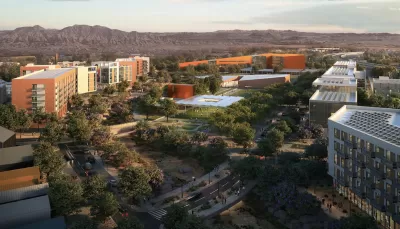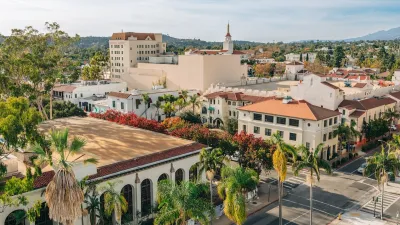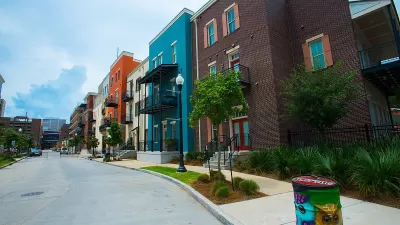The project is part of an initiative to build affordable housing on shuttered golf courses.

A former golf club in Las Vegas will be redeveloped into the largest affordable housing project in Nevada history, reports Christian Hudspeth for KTNV.
The project is being kickstarted by a $25 million loan from the State Infrastructure Bank. “The state said the first phase of the Desert Pines redevelopment will cost around $57.3 million, and $450 million overall.”
The project will provide over 1,000 affordable multifamily housing units and 280 market-rate homes. It will also include a community center early education center, job training center, and commercial space. “According to a release from the Nevada State Treasurer's Office, the master-planned community will support East Las Vegas with nearly 1,400 new homes and close to 7,400 jobs for the community.”
The work required for the project offers some of the strongest labor protections in the state, including a Project Labor Agreement, a mandate to hire at least 50 percent local Nevada residents, a prevailing wage rate, and other requirements.
FULL STORY: This East Las Vegas affordable housing project will be the largest in state history

Alabama: Trump Terminates Settlements for Black Communities Harmed By Raw Sewage
Trump deemed the landmark civil rights agreement “illegal DEI and environmental justice policy.”

Planetizen Federal Action Tracker
A weekly monitor of how Trump’s orders and actions are impacting planners and planning in America.

The 120 Year Old Tiny Home Villages That Sheltered San Francisco’s Earthquake Refugees
More than a century ago, San Francisco mobilized to house thousands of residents displaced by the 1906 earthquake. Could their strategy offer a model for the present?

LA’s Tree Emergency Goes Beyond Vandalism
After a vandal destroyed dozens of downtown LA trees, Mayor Karen Bass vowed to replace them. Days later, she slashed the city’s tree budget.

Sacramento Leads Nation With Bus-Mounted Bike Lane Enforcement Cameras
The city is the first to use its bus-mounted traffic enforcement system to cite drivers who park or drive in bike lanes.

Seattle Voters Approve Social Housing Referendum
Voters approved a corporate tax to fund the city’s housing authority despite an opposition campaign funded by Amazon and Microsoft.
Urban Design for Planners 1: Software Tools
This six-course series explores essential urban design concepts using open source software and equips planners with the tools they need to participate fully in the urban design process.
Planning for Universal Design
Learn the tools for implementing Universal Design in planning regulations.
Ada County Highway District
Clanton & Associates, Inc.
Jessamine County Fiscal Court
Institute for Housing and Urban Development Studies (IHS)
City of Grandview
Harvard GSD Executive Education
Toledo-Lucas County Plan Commissions
Salt Lake City
NYU Wagner Graduate School of Public Service





























